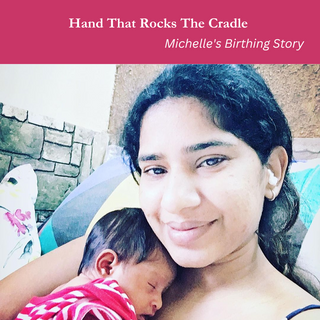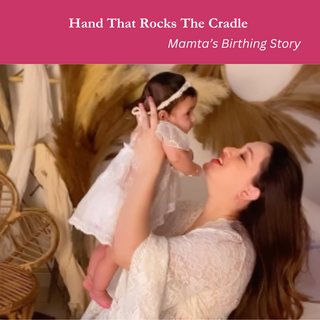*This is a podcast interview in the series - Regular Moms | Regular Birthing Stories*
In today's episode of "Hand that Rocks the Cradle" we have a fantastic and inspiring mother. Michelle Noronha shares her motherhood journey with us very bravely. She shares her traumatic experience with a miscarriage at 16 weeks and not getting the time to heal after that. She speaks about workplaces failing to give the needed support to women post a miscarriage.
"My miscarriage happened on a Wednesday and I took leave from work on Thursday and Friday and went back on Monday and they deducted the extra day leave that you get because of the weekend. And i was shocked.." she shares.
Watch her entire birth story video interview here :
Michelle's story is a raw and honest look into motherhood. She talks about her fears while being pregnant with her rainbow baby and the difficulties mothers face while managing career with motherhood. She speaks about practical solutions for working moms which she has learnt in the 5 years of being a mother. She shares with great detail her experience with Placenta Previa (low lying placenta) which had her quit her job since she was advised bedrest.
Her journey restarting her career is empowering and uplifting as she effortlessly puts into words the thought of every woman who has quit job due to motherhood and is wanting to enter the workforce again.
" And I started looking out, and I remember seeing jobs .I didn't get too many interview calls then because there was a break. Unfortunately when men take a break to travel the world I do think that it's okay. but if a woman takes the maternity break, either by choice or which is forced upon her or whatever her reason is her going back to work is difficult." she shares.
From tips to choosing the right day care to normalizing a C-section birth and advocating for the need for equal parenting and workplace cultures to be inclusive to mothers, Michelle's interview is a must watch.
"I believe information is key to everything, being informed is everything", she very wisely says which sums up this interview.
Do not miss this one moms!
You can also hear it in podcast (audio only) here :
"A happy mother is a good mother, and if work makes you hum, your whole family sings along." - Sharon Meers and Joanna Strober
Miscarriage Recovery : Balancing Healing and Professional Responsibilities.
Miscarriage, the loss of a pregnancy before the 20th week, is a profoundly emotional and devastating experience for women and their families.
Empowering Women After Miscarriage
Understanding Miscarriage:
Miscarriage is more common :than many people realize, affecting approximately 10-20% of known pregnancies. It is an unpredictable event that can occur due to various factors, including genetic abnormalities, hormonal imbalances, or maternal health conditions. The physical and emotional toll of miscarriage can be overwhelming, leaving women and their partners feeling isolated, grief-stricken, and uncertain about the future.
Creating a Supportive Workplace Culture
- Awareness and Sensitivity Training: Employers should prioritize educating their workforce about miscarriage, its prevalence, and the emotional impact it can have on individuals. By fostering an open dialogue and promoting empathy, organizations can break the silence surrounding miscarriage and create a culture of support and understanding.
- Flexible Leave Policies: Miscarriage recovery involves both physical and emotional healing, which can take time. Offering flexible leave policies that acknowledge the unique needs of women who have experienced a miscarriage can alleviate additional stress and allow individuals to prioritize their well-being during this challenging period.
- Confidentiality and Privacy: Respecting an employee's privacy is crucial. Encourage managers and colleagues to maintain confidentiality regarding the details of an individual's miscarriage and recovery process unless the employee chooses to share their experience voluntarily. Creating a safe space where women feel comfortable seeking support is essential.
If you are a working woman planning a baby, ensure you speak about matters like this beforehand with your employer.
How to deal with a miscarriage especially as a working woman? As hard as it is, there are several thigs you can do to heal. Read on!
Miscarriage is a painful experience that affects many women, and navigating the path to recovery can be particularly challenging for those who are also balancing a career. As a working woman, it is important to prioritize your physical and emotional healing after a miscarriage while also managing your professional responsibilities.
- Acknowledge and Process Your Emotions:
The emotional impact of a miscarriage can be overwhelming, and it's crucial to give yourself permission to grieve. Allow yourself to experience a range of emotions, from sadness and anger to guilt and confusion. Seek support from loved ones, friends, or even professional counselors who can help you navigate these complex feelings. Remember that healing takes time, and it's okay to prioritize your emotional well-being.
- Communicate with Your Employer:
Open and honest communication with your employer is vital during this time. Let them know about your miscarriage and discuss any necessary workplace accommodations or adjustments that may support your recovery. This could include flexible working hours, reduced workload, or temporary changes in job responsibilities. By sharing your needs, you can create an environment that allows you to heal without compromising your professional obligations.
- Seek Support from Colleagues:
Reach out to understanding colleagues or close friends at work who can provide a listening ear and emotional support. Having someone you trust to confide in can make a significant difference in your recovery process. Consider joining support groups or online communities where you can connect with other women who have experienced miscarriages. Sharing your stories and insights can be therapeutic and help you feel less alone in your journey.
- Prioritize Self-Care:
Self-care is crucial for your physical and emotional recovery. As a working woman, finding the balance between work and self-care may be challenging, but it is essential. Schedule regular breaks throughout the day to relax and recharge. Engage in activities that bring you joy and peace, such as exercise, meditation, journaling, or spending time in nature. Taking care of yourself will enhance your overall well-being and aid in the healing process.
- Set Boundaries:
In the workplace, it's important to set boundaries that protect your emotional well-being. Be assertive in communicating your needs and limitations. Learn to say no to additional tasks or responsibilities that may overwhelm you during this sensitive time. By setting clear boundaries, you can ensure that you have the time and energy to focus on your recovery.
We want you to know that you are not alone and its not your fault. You deserve to take time to heal and rest and with time everything will fall into place. Do not blame yourself for what happened and surround yourself with people who support and uplift your. This is the time to focus on your own self. Remember, your well-being should always be a top priority, and by giving yourself the compassion and care you need, you can move forward with strength and resilience.
Every mom needs a village! We have built that community for you-join us and meet your mom friends!


